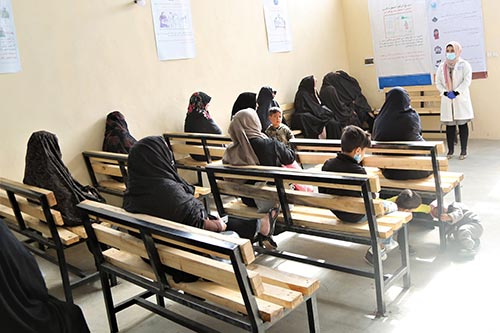News
As Afghanistan grapples with surge in COVID-19 cases, one midwife shares her strength
- 23 June 2021
News
HERAT CITY, Afghanistan – Mastura Zia, a 27-year-old midwife in Herat, does not mince words when describing the hardships of the global pandemic: “2020 was the hardest year of my life,” she said.
Ms. Zia is a frontline responder at the Gazargah Transit Centre, providing reproductive health services to deportees who have returned to Afghanistan from Iran. When the pandemic struck, around February 2020, tens of thousands of undocumented Afghans were deported, flooding the transit centre.
“Everybody was scared and the camp received thousands of deportees daily,” Ms. Zia remembered. “There were many deportees who were pregnant women and in critical situations in need of urgent support. I had to support them.”

The health centre in Gazargah Transit Centre is supported by UNFPA, providing many essential reproductive health services. But Ms. Zia said many of her cases were serious and in need of specialized care.
“The service seekers, particularly the pregnant women whose situations were critical, needed to be referred to the provincial maternity hospital,” she explained. “But it wasn’t only pregnant women who were in need. Many others had signs of COVID-19. Those I referred to the Herat COVID-19 hospital for testing.”
It wasn’t long before she fell ill herself. Last July, she tested positive for COVID-19.
“I followed the preventative measures to protect myself from infection, but close and daily interaction with patients resulted in my eventual infection.”
She spent three weeks in treatment and isolation – but the health needs of returnees continued. “The services didn’t stop while I was in quarantine. Another midwife supported my function during this period.”
Ms. Zia graduated from the Herat Midwifery Institute, a UNFPA partner, in 2012, and started working with UNFPA-supported projects in 2018.
Her husband is supportive of her work, something not all working women in Afghanistan can count on. “I enjoy my career. I see the positive results every day. My biggest happiness is when the pregnant mothers tell me that they found my support useful,” she said.
This remains true even as conditions grow more challenging for health workers.
To date, there have been over 100,000 confirmed cases of COVID-19 in Afghanistan, and cases have risen steadily in recent weeks.
In addition to the sexual and reproductive health care they provide, staff at the Gazargah Transit Centre also ensure returnees receive psychosocial services, part of UNFPA’s humanitarian response to the crisis. The centre and its partners also provide shelter to those who need it, as well as case management, assistance for unaccompanied minors and other support.
“This is emergency response work," Ms. Zia said. "Although I am usually overloaded with cases, I feel proud to see the good result of my work at the end of the day."